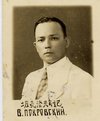|
|
| Line 4: |
Line 4: |
| | </div> | | </div> |
| | <!--nb. portrait images at ~100px, landscape images at ~200px--> | | <!--nb. portrait images at ~100px, landscape images at ~200px--> |
| − | [[Image:Victor A. Pokrovsky.jpg|100px|left]]'''Victor Alexandrovich Pokrovsky''' was choir director, translator, and music arranger for Metropolitan [[Sergius (Tikhomirov) of Japan]], serving in that position at the [[Holy Resurrection Cathedral (Tokyo, Japan)]] from 1924 until 1962, except for the World War II years and some of the decade following the war. He followed in the tradition of Russian [[missionary|missionaries]] of bringing the [[Gospel]] to new people in their language. In Japan, he followed in the tradition of Ss. [[Innocent of Moscow]] and [[Nicholas of Japan]] and of Nicholas's successor Sergius. In regard to liturgical music of the Japanese Orthodox Church, Victor Pokrovsky was to Sergius as [[Yakov Tikhai]] was to St. Nicholas. Victor's success was bringing the Russian liturgical music masters to the Japanese in their own language. Metr. Sergius invited Victor, an emigré of the Russian civil war, to Tokyo to introduce to the [[Church of Japan|Japanese Church]] the [[Russian Chant|Russian liturgical masterpieces]] of 19th and 20th century, in Japanese. Their association and close collaboration continued until events associated with World War II brought it to an end. | + | [[Image:VPokrovsky_c1925.jpg|100px|left]]'''Victor Alexandrovich Pokrovsky''' was choir director, translator, and music arranger for Metropolitan [[Sergius (Tikhomirov) of Japan]], serving in that position at the [[Holy Resurrection Cathedral (Tokyo, Japan)]] from 1924 until 1962, except for the World War II years and some of the decade following the war. He followed in the tradition of Russian [[missionary|missionaries]] of bringing the [[Gospel]] to new people in their language. In Japan, he followed in the tradition of Ss. [[Innocent of Moscow]] and [[Nicholas of Japan]] and of Nicholas's successor Sergius. In regard to liturgical music of the Japanese Orthodox Church, Victor Pokrovsky was to Sergius as [[Yakov Tikhai]] was to St. Nicholas. Victor's success was bringing the Russian liturgical music masters to the Japanese in their own language. Metr. Sergius invited Victor, an emigré of the Russian civil war, to Tokyo to introduce to the [[Church of Japan|Japanese Church]] the [[Russian Chant|Russian liturgical masterpieces]] of 19th and 20th century, in Japanese. Their association and close collaboration continued until events associated with World War II brought it to an end. |
| | | | |
| | | | |
| | '''''Recently featured:''''' [[Akathist]], [[Apostles]], [[Irene Chrysovalantou]], [[Paschal greeting]], [[Holy Week]]. ''Newly [[:Category:Featured Articles|featured articles]] are presented every '''Friday'''.'' | | '''''Recently featured:''''' [[Akathist]], [[Apostles]], [[Irene Chrysovalantou]], [[Paschal greeting]], [[Holy Week]]. ''Newly [[:Category:Featured Articles|featured articles]] are presented every '''Friday'''.'' |
Revision as of 22:22, May 19, 2006
Victor Alexandrovich Pokrovsky was choir director, translator, and music arranger for Metropolitan
Sergius (Tikhomirov) of Japan, serving in that position at the
Holy Resurrection Cathedral (Tokyo, Japan) from 1924 until 1962, except for the World War II years and some of the decade following the war. He followed in the tradition of Russian
missionaries of bringing the
Gospel to new people in their language. In Japan, he followed in the tradition of Ss.
Innocent of Moscow and
Nicholas of Japan and of Nicholas's successor Sergius. In regard to liturgical music of the Japanese Orthodox Church, Victor Pokrovsky was to Sergius as
Yakov Tikhai was to St. Nicholas. Victor's success was bringing the Russian liturgical music masters to the Japanese in their own language. Metr. Sergius invited Victor, an emigré of the Russian civil war, to Tokyo to introduce to the
Japanese Church the
Russian liturgical masterpieces of 19th and 20th century, in Japanese. Their association and close collaboration continued until events associated with World War II brought it to an end.
Recently featured: Akathist, Apostles, Irene Chrysovalantou, Paschal greeting, Holy Week. Newly featured articles are presented every Friday.
